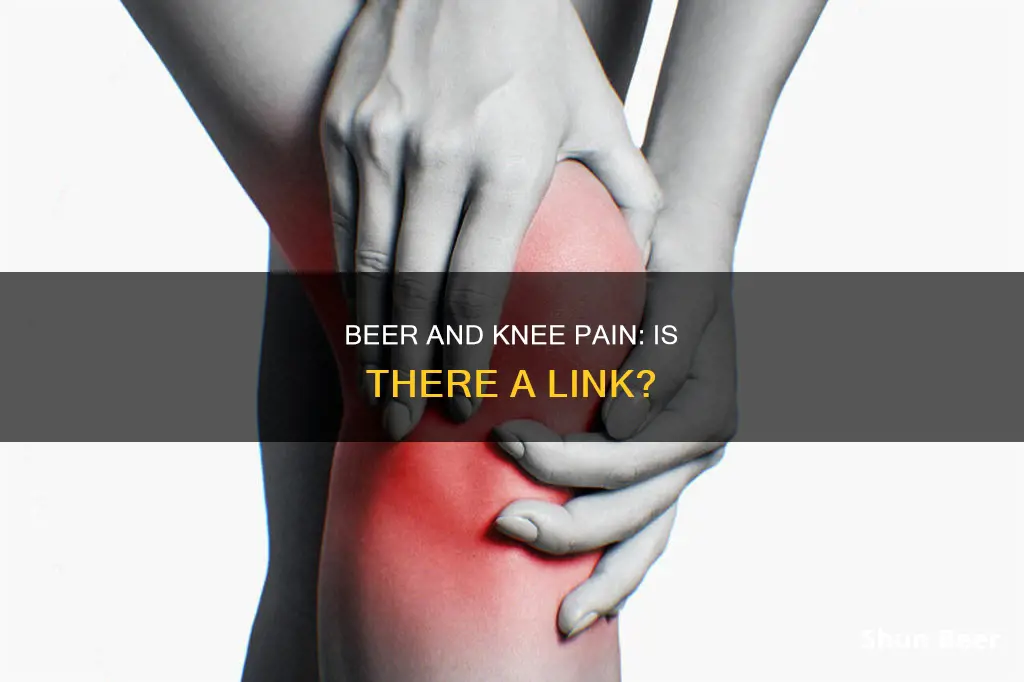
Alcohol consumption is known to have adverse effects on the body, and drinking beer has been linked to causing or exacerbating knee pain. Beer is high in purines, which can trigger gout attacks. Gout is a type of inflammatory arthritis that affects the joints, causing pain and swelling. While moderate drinking may reduce the risk of developing arthritis, it can worsen existing joint pain and inflammation, especially for those with conditions like gout or rheumatoid arthritis. Alcohol's diuretic properties can also lead to dehydration, further contributing to body aches and cramps. Additionally, alcohol interferes with muscle recovery and can relax the muscles, impacting coordination and balance. The impact of beer consumption on knee pain can vary among individuals, but it is essential to be mindful of potential negative consequences and consult a doctor if concerns arise.
| Characteristics | Values |
|---|---|
| Alcohol consumption and joint pain | Alcohol can cause or exacerbate joint pain and acute inflammation, even in small amounts. |
| Alcohol and arthritis | Alcohol may reduce the risk of developing rheumatoid arthritis (RA) and has anti-inflammatory effects, but only in moderate amounts. |
| Alcohol and gout | Beer and other alcoholic drinks are high in purines, which can trigger gout attacks. |
| Alcohol and medication interactions | Alcohol can increase the risk of liver damage when taken with certain medications for arthritis, such as methotrexate and leflunomide. It can also increase the risk of gastrointestinal bleeding when combined with non-steroidal anti-inflammatory drugs (NSAIDs). |
| Other effects of alcohol on the body | Alcohol can cause dehydration, weight gain, sleep disturbances, and delayed healing, all of which can impact joint pain. |
What You'll Learn
- Beer is purine-rich, which can cause gout and lead to knee pain
- Alcohol can cause dehydration, leading to body aches and cramps
- Alcohol can interfere with rheumatoid arthritis (RA) medications
- Alcohol can cause gastrointestinal bleeding when mixed with NSAIDs
- Alcohol can hinder muscle recovery and make the body ache

Beer is purine-rich, which can cause gout and lead to knee pain
Alcohol consumption, in general, can also cause or aggravate joint pain. Alcohol is inflammatory and can increase inflammation in the body, which can make inflammatory conditions such as arthritis and gout more severe. Alcohol also depletes the body of water and nutrients, causing further inflammation and pain in the joints. Even small amounts of alcohol may have adverse health effects for some individuals.
Alcohol abuse can decrease bone density, which can complicate arthritis and increase the chance of fractures. It can also cause or exacerbate acute inflammation. In addition, alcohol consumption can hinder muscle recovery and impair the body's ability to heal itself.
Alcohol can also interfere with medications used to treat arthritis, such as non-steroidal anti-inflammatory drugs (NSAIDs) and acetaminophen, increasing the risk of liver damage and kidney damage. Therefore, it is essential to consult a doctor about alcohol consumption if you are taking any medications.
Millenials' Work Culture: Beer on the Job?
You may want to see also

Alcohol can cause dehydration, leading to body aches and cramps
To maintain hydration while drinking alcohol, it is recommended to alternate alcoholic drinks with a glass of water. This simple strategy can help prevent dehydration and reduce the risk of body aches and cramps. It is also beneficial in preventing a hangover, improving overall well-being.
Additionally, alcohol can worsen existing joint pain and inflammation. It depletes the body of water and nutrients, leading to increased inflammation and pain in the joints. This effect is particularly pronounced in individuals with pre-existing conditions such as fibromyalgia, gout, and various types of arthritis. Alcohol can also decrease bone density, further complicating arthritis and increasing the risk of fractures.
Furthermore, alcohol interferes with the body's immune system, impeding the healing process and making individuals more susceptible to existing and new health conditions. It can also negatively impact sleep quality, and fatigue can intensify pain. Alcohol's high calorie and sugar content can contribute to weight gain, placing additional stress on the joints.
Therefore, it is crucial to be mindful of alcohol consumption and its potential impact on the body, especially for those with joint-related concerns. Consulting a doctor or healthcare professional is advised to understand the risks and make informed decisions regarding alcohol consumption.
Beer Glasses and Children: Safe Drinking Options
You may want to see also

Alcohol can interfere with rheumatoid arthritis (RA) medications
Alcohol can have both positive and negative effects on rheumatoid arthritis (RA). While moderate drinking may reduce the risk of developing RA, if you already have arthritis, drinking alcohol may do more harm than good.
Alcohol's Anti-Inflammatory Effects
According to some studies, moderate alcohol consumption can reduce biomarkers of inflammation, including c-reactive protein (CRP), interleukin-6, and TNF-alpha receptor 2. This may be one of the reasons why moderate drinking appears to lower cardiovascular disease risk. However, excessive drinking can increase inflammation in the body, and alcohol is inflammatory overall.
Medication Interactions
Once you have arthritis, drinking may have more downsides than benefits due to medication interactions. Many medications prescribed to relieve sore joints, such as non-steroidal anti-inflammatory drugs (NSAIDs) like ibuprofen (Motrin) or naproxen (Aleve), carry a greater risk of stomach bleeding and ulcers when mixed with alcohol. Alcohol can also increase the risk of liver damage when taken with acetaminophen, methotrexate, or leflunomide (Arava). Janus kinase inhibitors (JAK) are a newer class of oral medications for RA, and while they pose less of a risk for liver toxicity, it is still recommended to get blood tests to check liver function.
Gout Attacks
Alcohol is particularly problematic for those with gout, a type of inflammatory arthritis. Beer, distilled liquor, and wine are high in purines, which can trigger gout attacks.
Other Risks
Excessive drinking can damage your body in numerous ways, increasing the risk of various diseases, including cancers of the breast, colon, and esophagus, as well as conditions like diabetes and stroke. Alcohol can also interfere with sleep quality, which is essential for managing RA pain, and can hinder muscle recovery and building muscle mass.
Recommendations
If you have arthritis and want to drink, it is essential to talk to your doctor. Even with a doctor's approval, it is recommended to limit yourself to one drink per day for women and two drinks per day for men. It is also crucial to be vigilant about liver tests if taking medications metabolized by the liver, as keeping an eye on blood work can help detect early signs of liver issues.
Drinking Beer While on Dbol: What You Need to Know
You may want to see also

Alcohol can cause gastrointestinal bleeding when mixed with NSAIDs
Drinking beer can indeed cause knee pain. Alcohol can increase inflammation and pain in the joints, and it can also cause acute inflammation. Beer is purine-rich, which can cause gout—a condition that results in debilitating episodes of pain.
Alcohol can also cause gastrointestinal bleeding when mixed with nonsteroidal anti-inflammatory drugs (NSAIDs). The most commonly used NSAIDs are aspirin and ibuprofen, which are readily available over the counter. Kaufman and associates studied the relationship between aspirin and ibuprofen in upper gastrointestinal bleeding with various levels of alcohol consumption. The study included 1,224 patients who were admitted for upper gastrointestinal bleeding. The relative risk of upper gastrointestinal bleeding increased with the quantity of alcohol consumption, up to 2.8 in heavy drinkers. The use of aspirin further increased the risk at all levels of alcohol consumption. With regular use of aspirin, the relative risk for upper gastrointestinal bleeding in alcohol consumers taking more than 325 mg of aspirin per day was 7.0. Similarly, regular use of ibuprofen was found to increase the relative risk for upper gastrointestinal bleeding in alcohol consumers. Therefore, it is essential to consult a doctor before consuming alcohol with painkillers.
Appendix Surgery: Beer Drinking Timeline and Safety
You may want to see also

Alcohol can hinder muscle recovery and make the body ache
Alcohol can indeed hinder muscle recovery and make the body ache. Here are some ways in which alcohol can affect the body in these ways:
Dehydration
Alcohol is a diuretic, which means it increases urine production and can lead to dehydration. This can contribute to body aches and cramps, as adequate hydration is necessary to keep joints lubricated and reduce inflammation.
Delayed Healing and Impaired Immune System
Alcohol can directly impede the body's ability to heal and recover, delaying the muscle recovery process. It suppresses the immune system, making the body more susceptible to illness and prolonging recovery.
Disruption of Protein Synthesis
Alcohol inhibits muscle growth by disrupting protein synthesis, which is essential for building new muscle. It also interferes with signals that tell the body to build muscle, allowing for the activation of molecules that cause muscle wasting.
Induction of Insulin Resistance
Insulin is a potent stimulator of muscle growth and recovery. Alcohol induces insulin resistance, limiting the absorption of carbohydrates into muscles and impairing muscle growth and recovery.
Sleep Disturbance
Alcohol can disrupt sleep patterns, which is important for muscle recovery and tissue repair. While it may initially help people fall asleep, it can make it difficult to stay asleep, leading to daytime drowsiness, fatigue, and poor concentration.
Nutritional Deficiencies
Alcohol lacks nutritional value and can impair the absorption of nutrients, including protein, which is necessary for muscle growth and recovery. It can also increase the likelihood of consuming junk food, which can contribute to inflammation in the body.
While the impact of alcohol on muscle recovery and body aches can vary depending on individual factors, it is clear that alcohol can hinder the body's ability to recover and repair muscles. Therefore, it is essential to drink in moderation or avoid alcohol altogether to support optimal muscle health and recovery.
Drinking and Driving: One Beer, Safe to Drive?
You may want to see also
Frequently asked questions
Drinking beer can lead to body aches and cramps due to dehydration. Beer is also high in purines, which can trigger gout attacks. Gout is an inflammatory type of arthritis that can cause severe joint pain.
Gout is caused by purine-rich foods and drinks. Beer is high in purines and can, therefore, be a trigger.
Alcohol acts as a diuretic, increasing urine production and fluid loss from the body. This can lead to dehydration, causing body aches and cramps.
Beer can interfere with certain medications for arthritis, increasing the risk of liver damage and gastrointestinal bleeding. It can also affect sleep quality, which is important for managing arthritis pain.







